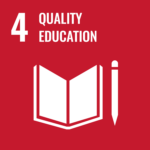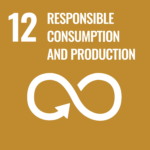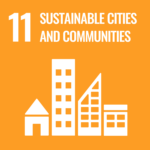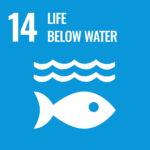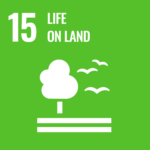Adding Value to Plastic Waste in Cameroon
Analysing the impact of plastic waste in Yaoundé to explore potential recycling solutions
This project aims to diagnose the current management of plastic waste in the capital Yaoundé and to characterize this waste in order to know the different typologies and the respective proportions. Then, the different ecological impacts of this plastic waste will be studied and solutions applicable to the local context will be proposed. What is special about this project is that four master's theses and one doctoral thesis are linked to it.
The sub-objectives of this research projects are:
- Characterization of plastic waste in Yaoundé
- Examination of the effects of plastic waste on water, soil and air
- Provide resulting data to other researchers, farmers and people working in the water sector
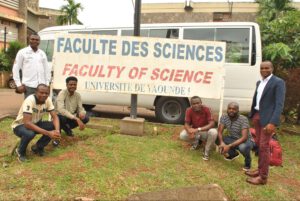
Figure 1: Team picture
Quarterly project updates
Literature research was conducted to become familiar with different types of plastic waste, their impacts on ecosystems and methods of how to characterize plastic waste. In addition, the students started to systematically study the most polluted areas of Yaoundé and identify the main actors in the plastic waste management: Producers (companies), consumers (households), recyclers (associations or companies) and farmers. Further, two training sessions were organized with the students at the University of Yaoundé to discuss, among other things, different data collection processes and methodologies.
The actual data collection took place over a period of eight days for the household surveys (435 households), three days for the businesses and associations involved in plastic waste management, and again three days for the survey of farmers whose agricultural work is affected by plastic pollution. In a total of 25 zones, a total of 250 kg of plastic waste was collected and the impact of the waste on the environment is recorded by means of photos and measurements of air, soil and water quality. In addition, the project team collects samples of the plastic waste to analyse which types of plastic are most frequently found in the waste.
During the second quarter, the students evaluated the results of the surveys and collected waste from a total of 210 households of those consulted before. For this, each household was given a rubbish bag and asked to dispose of their plastic waste in it for 14 days. This was a novelty for many of the participating households and led to some problems. Nevertheless, 145 filled rubbish bags were collected.
In addition, waste from drains and basins used to irrigate fields was collected. The team did not shy away from entering wastewater with intense odors and sometimes dangerous flow conditions for the project.
The collection was followed by the sorting of the waste into the main categories "hard", "soft" and "other", as well as into subcategories depending on the type of plastic present. Sorting was a huge amount of work as large quantities of plastic were collected. Overall, the team expects to gain an overview of local plastic waste pollution with a focus on characterisation and localisation in their city. In cooperation with a recycling company, tailor-made solutions for reduction could then be developed as the next step.
The third quarter was particularly exciting and insightful as the students investigated various impacts of plastic waste on the environment. The project team conducted a floristic inventory, collected and analysed water samples, collected soil samples in agricultural areas and assessed air parameters at sites with heavy plastic pollution. Various chemical parameters, provided information on the suitability of the biotopes as habitats for animals and plants.
Difficulties in carrying out the measurements arose due to heavy rainfall, which caused delays. Additionally, the team was not able to measure air parameters such as carbon monoxide and methane with the available equipment. Also the soil samples and fish tissues collected in waters with high plastic pollution could not be analysed for microplastics yet. Nevertheless, the third quarter was successful and marked by many results.
The fourth quarter was dominated by writing the final report, which in the case of this project is particularly detailed.
Overall, most targets were achieved in this project despite some difficulties as described in the previous section. The students stated the achievements to be satisfactory and have sufficient data to write their thesis. Similarly, the PhD student, who is also the project leader, has the quantity and quality of data to write at least one good scientific article and to start writing his PhD thesis based on the final report.
The student’s research provides important information on the suitability of local habitats for animals and plants taking into consideration the plaguing plastic pollution in the capital of Cameroon. The high quantity of data generated by the students is important for stakeholders and researchers working in the agriculture and water sectors. All together, this project has been concluded successfully! The students are very much looking forward to continuing the research in a future project and generating more scientific-based value by addressing plastic pollution with their work.
The scientific report is listed below
Photo Gallery
Abbildung 2: Standorte der Abfallsammlung: Mülldeponie in Yaoundé (links); Hausmülldeponie (mittig); Foto des Bodens eines der befragten Landwirte (rechts)
Figure 3: Collection zones "agriculture" (left) and one of the irrigation basins (right)
Figure 4: The team weighing and sorting the waste from one of the collection points.
Figure 5: Locations of soil (left) and water (right) sampling
Figure 6: Collection of plastic bottles in Yaounde (left) and water sampling (right)
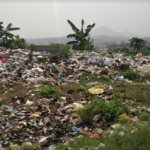
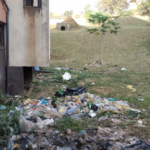

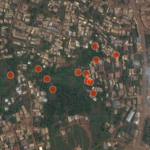
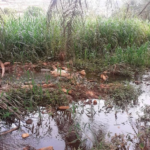
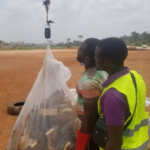

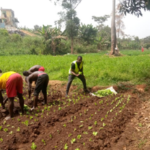
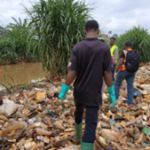
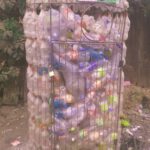
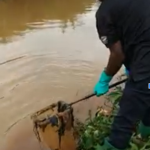
Facts
- Country: Cameroon
- Region Yaundé
- Project abbreviation: CMR-001
- Project start / project end: Nov 2021 – Nov 2022
- Project budget: 6.513.111,00 FCFA
(appr. 10,000.00€, currency exchange rate as of 29 Jan 2022) - Scholarship per person: 135.000,00 FCFA
(appr. 205.00 €, currency exchange rate as of 29 Jan 2022) - University: Université de Yaoundé I
- Local partner: FOOTPRINT
- Number of students: 4 Students, 1 PhD student (0 female)
- Supervisor: Dr. Djumyom Wafo Guy Valerie
- Mentor: Charlotte Dorville
- 3E4A-Coordinator: Contimi Kenfack Mouafo
SDGs
Primary SDGs
Secondary SDGs
Scientific Report
View the scientific report here
Partners
FOOTPRINT
Team
Aurelien
Douandji Tchoupou
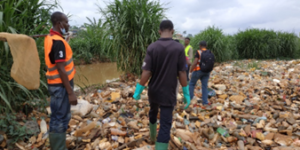
Cédric Stéphane
Taziebou Simo
Merlin
Noumbou Djou
Pavel
Ngoumnai
Yves Boris
Messebe
Supervisor
Dr. Guy Valerie
Djumyom Wafo
Mentor
Charlotte
Dorville
